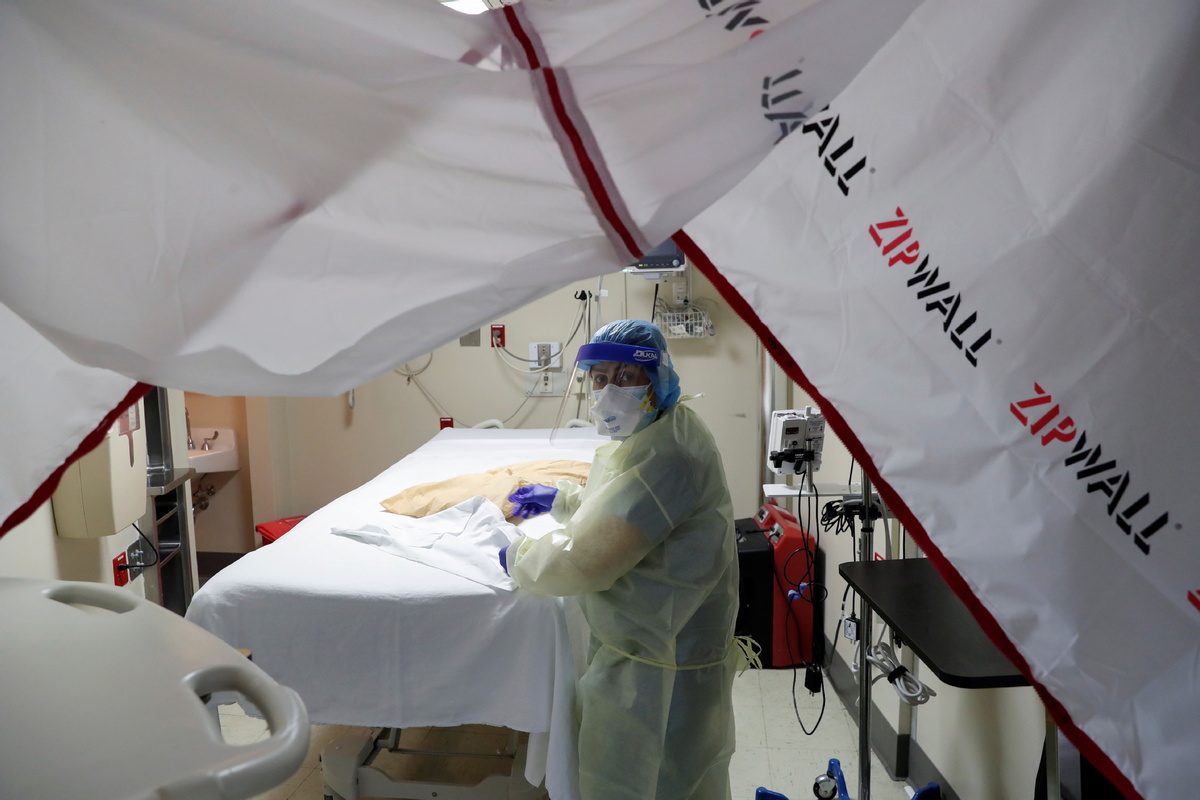US hospitals overwhelmed by COVID-19 cases
By AI HEPING in New York | China Daily Global | Updated: 2020-12-02 10:13

Rhode Island is setting up field hospitals to handle COVID-19 patients. New York may call on retired doctors and nurses for help. In Reno, Nevada, a medical center began moving some coronavirus patients into its parking garage. West Virginia and Pennsylvania are looking at delaying elective surgeries as virus numbers surge.
Across the United States, from major cities to rural communities, hospitals are under siege as COVID-19 cases mount. The coronavirus is spreading so fast in Nevada that one person is diagnosed with it every minute, and someone is dying from it every two hours, state health officials said on Nov 25. Some hospitals lack enough doctors and nurses and protective equipment, as well as ventilators; others don't have enough hospital beds.
A record 96,039 COVID-19 patients were hospitalized in the US as of Monday evening, according to the Covid Tracking Project. More than 30 percent of all cases ever reported in the US happened in November, according to data from Johns Hopkins University. Now the big concern is overwhelmed hospitals, which can lead to more deaths.
And the big fear is that cases will mount because so many Americans traveled for the long Thanksgiving holiday, and cases are unlikely to show in public data until the first full week of December at the earliest.
"Perhaps the worst days are ahead of us," said Dr Clay Marsh, West Virginia's COVID-19 czar.
A University of Arizona COVID-19 modeling team recently urged the state to take action to stem hospitalizations or else "risk a catastrophe on a scale of the worst natural disaster the state has ever experienced".
The Kansas Hospital Association reported on Monday that about 44 percent of its hospitals were anticipating staff shortages.
California Governor Gavin Newsom on Monday told reporters that the intensive care unit bed capacity in the state might reach 112 percent by Christmas Eve, if the trend of surging coronavirus cases continues.
In Texas, some 5,550 extra medical personnel have been deployed around the state, said Lara Anton, a spokeswoman for the state's health services department. That doesn't include help from the military and volunteer organizations.
Brock Slabach, senior vice-president of the National Rural Health Association in suburban Kansas City, said it takes "space, staff and stuff" to run a rural hospital. "If you don't have any one of those three, you're really hamstrung," he said, noting that many hospitals face shortages in all three areas.
There is a staff shortage at Scotland County Hospital in Memphis, Missouri, population 1,800. The hospital has 25 beds, six doctors and 23 registered nurses, but the increase in COVID-19 cases is so severe that the hospital put out an appeal for help from anyone with healthcare experience, including retirees, according to Fox News.
Rural hospitals in Texas have reported difficulty transferring patients as larger hospitals in Lubbock, Amarillo and other larger cities run short of beds.
In New York on Sunday, the state reported 3,500 hospitalizations for COVID-19 — a number first seen in March. The state is close to overwhelming its hospital system with new cases, Governor Andrew Cuomo said Monday. "I think of this as a war," he said. "COVID is an enemy that we're dealing with."
Cuomo said that the strength of the virus' second wave has forced the state to rely less on test-positivity rates as the determinant for restrictions and focus more on hospital capacity. He said the possibility of a "critical hospitalization situation" could trigger a regional return of the most stringent measures taken in the spring, which led to the closure of all nonessential businesses statewide.
Larger hospital systems in the state also must balance their patient loads, the governor said. "This is a mandate from the state Department of Health: You must distribute patients across your system," he said, adding that hospitals that don't follow the edict could face malpractice charges from the state.
Cuomo said that if hospitals become overwhelmed, he could impose a regionally based shutdown or "pause" order as he did statewide in the spring. "We are not going to live through the nightmare of overwhelmed hospitals again," he said.
Every hospital in the state must begin compiling a list of retired doctors and nurses that they can draw from, Cuomo said. "I am very worried about staff shortages," he said. "We can build beds. We can't create more staff."
In Rhode Island, residents received a public safety warning on their phones Monday. "Hospitals at capacity due to COVID," the alert from the governor's office said.
The state has assembled two field hospitals. One started taking patients Monday; the other could start taking patients this week.
Field hospitals won't solve the crisis if they don't have enough healthcare workers, said Dr Megan Ranney, director of the Brown-Lifespan Center for Digital Health at Brown University.
"If you have hundreds of staff who are sick — which is what many states across the country are currently facing — if you don't have nurses and doctors and respiratory techs, even a field hospital isn't going to save you," Ranney said. "There's no way that the hospitals can be fully prepared for what we're currently facing. Our healthcare system is literally at the breaking point right now, thanks to COVID-19."
























